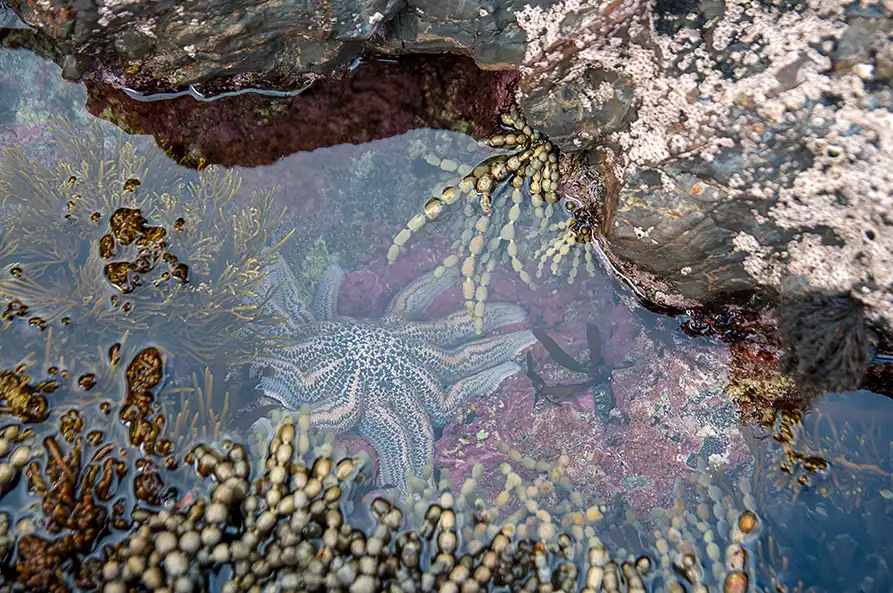Introduction
Subject definition: Global warming has caused a continuous increase in the temperature of the oceans, which significantly affects marine ecosystems. This phenomenon affects marine flora by causing coral bleaching and algae to disappear, and marine fauna by forcing fish and other creatures to migrate to colder waters or face extinction. The changes threaten biodiversity and have economic and social consequences for the fishing industry and maritime tourism, requiring urgent measures to protect and conserve these important ecosystems.
Objective: The purpose of this report is to analyze and document the impacts of rising ocean temperatures on marine flora and fauna, to understand the ecological, economic and social changes caused by this phenomenon and to identify effective strategies for the protection and conservation of marine ecosystems.
Methodology: The realization of this report relies on research done online from various academic writings, various articles and other reliable sources.
Why are the oceans warming?
Since the beginning of the Industrial Revolution several hundred years ago, humans have burned massive amounts of fossil fuels ; cut large parts of forests and engaged in many other activities that pump heat-trapping carbon dioxide into Earth's atmosphere.
Only about one percent of all that trapped heat stayed in the atmosphere, but it had a big effect, warming the air from the Earth's surface by about 1°F (0.6°C) on average over the past two centuries.
Most of the rest of the trapped heat has been absorbed into the planets' vast oceans. Since the 1970s, oceans have absorbed more than 90 percent of all excess heat energy trapped by CO 2 . Because the oceans are large and because water takes much more energy to heat than air, this translates into a temperature increase of of just over one degree Fahrenheit , on average over the past century.
But warming is accelerating. The surface of the ocean is warming about 24 percent faster than a few decades ago, and this rate is likely to increase in the future. rreth 24 për qind më shpejt sesa disa dekada më parë , dhe kjo normë ka të ngjarë të rritet në të ardhmen.

Figure 1: Ocean warming [4].
The highest record of ocean temperatures
Global average sea surface temperature hit an all-time high of 69.73 degrees Fahrenheit on July 31st 2023, according to a dataset maintained by Copernicus, the Earth observation component of the European Union's space program.
In addition to the daily record on July 31, the monthly sea surface temperature for July was the hottest July on record, "by far," Copernicus said. The anomaly for July, which is a measure of the difference between sea surface temperature and the long-term average for that month was 0.92 degrees Fahrenheit, according to Copernicus.
Factors that influence the increase of ocean temperatures
These record sea surface temperatures arise from multiple factors, including the El Niño weather pattern, which is currently in effect.
But global warming is also contributing. "It would be nearly impossible to reach these ocean temperatures without the increased increase in greenhouse gases from fossil fuel burning and other human activities.
Human-caused carbon dioxide emissions are affecting the ocean in three main ways:
- Earming. Greenhouse gases in the atmosphere trap energy from the sun. The ocean absorbs a lot of this energy, causing the ocean waters to warm. Warmer waters also contribute to rising sea levels.
- Acidification. The ocean's absorption of carbon dioxide from the atmosphere is changing the ocean's pH, making seawater more acidic.
- Low oxygen levels. Warm water cannot hold as much oxygen as cold water.
CLARIFICATION: El Niño and La Niña are natural phenomena that disrupt weather patterns around the world. During El Niño the ocean surface temperatures of the Pacific Ocean are higher than normal. During La Niña, its colder counterpart, ocean temperatures are lower than normal.
How is climate change affecting the world's ocean?
- Sea level rise: Sea level rise has accelerated in recent decades due to increased ice loss in the world's polar regions. Latest data from World Meteorological Organization show that global mean sea level reached a new record in 2021, rising by an average of 4.5 millimeters per year over the period 2013-2021. Along with the intensification of tropical cyclones, sea level rise has exacerbated extreme events such as deadly storms and coastal hazards such as flooding, erosion and landslides, which are now predicted to occur at least once a year in many countries. Such events happened historically once in a century.
- Marine heat waves: Marine heat waves have doubled in frequency and have become more persistent, more intense and more widespread. The IPCC says that human influence has been the main driver of increase in ocean heat observed since the 1970s. Most of the heat waves occurred between 2006 and 2015, caused widespread coral bleaching and reef degradation. In 2021, nearly 60 percent of the world's ocean surface experienced at least one period of marine heat waves. The UN Environment Program says that every coral reef in the world could bleach by the end of the century if the water continues to warm.
- Loss of marine biodiversity: Rising temperatures increase the risk of irreversible loss of marine and coastal ecosystems . Today, extensive changes have been observed, including damage to the coral reefs and mangroves that support life in the ocean, and the migration of species to higher latitudes and altitudes where the water may be cooler.
Some fish, such as herring and whiting, are moving towards the polar regions in search of cooler water. Ngrohja e papritur mund t’i shkatërrojë këto peshkime. Ata kanë nevojë për temperatura të qëndrueshme të ujit brenda intervaleve specifike për të pjellur dhe mbajtur popullata të shëndetshme.
Other fish, such as black sea carp, are moving away from coastal areas into deeper waters, which may further cause environmental injustices. This can have a profound effect on small-scale artisanal fishers who do not have vessels equipped for longer-distance, deep-water fishing—exacerbating the disparities between under-resourced coastal communities and the large-scale industry.
Species that live or spawn in coastal habitats, such as mangrove forests and coral reefs, may die. For example, coral bleaching events from warm, acidified water have been found to affect the behavior and feeding of reef fish such as butterflyfish, which in turn affect surrounding wildlife and the dynamics of the entire ecosystem.
Species that already live in deep, cold waters are disappearing. The collapse of Alaska's snow crab fishery earlier this year had complex causes, but NOAA confirms that factors related to "heat wave conditions," even as deep as the ocean floor in the Bering Sea, contributed to the deaths.
Other impacts:
- Impacts on Marine Fisheries: Fishing Commercial and recreational marine fisheries in some regions are at high risk from climate change in the size and distribution of fish populations. Some fish species have already shifted their geographic range in response to climate change. Climate change is also affecting the timing of seasonal events, which can affect fisheries. For example, some species, such as striped bass, are spawning earlier in the year. This means that catches may peak earlier than normal. Fisheries will have to adapt to such changes or risk reduced catches and lost income, which could also raise prices for consumers.
- Marine Environment and Economy: Many American industries depend on the ocean. As of 2019, almost 2.4 million Americans had ocean-related jobs in fields including fishing, construction, tourism, real estate, food service, and transportation. The Atlantic and Pacific oceans are both major trade channels for the import and export of goods.The United States also extracts oil, gas, sand and gravel from the ocean. The ocean also provides many benefits that are more difficult to measure in economic terms. These are called ecosystem services . Carbon storage, water filtration and shoreline protection are just a few of the many ecosystem services the ocean provides.
What can we do?
We can help reduce the impact of climate change on the marine environment in many ways, including the following:
- Adjust fishery management. Fisheries professionals and government officials can help people adapt to climate change by changing policies and practices to avoid overfishing and maintain healthy marine ecosystems.
- Reduktoni përdorimin e energjisë. All of us could take action to decrease carbon emissions , gjë që mund të ndihmojë në uljen e ngrohjes dhe acidifikimit të oqeanit.
- Buy sustainable Planifikoni vaktet tuaja me ushqim deti të korrur në mënyrë të qëndrueshme për të mbajtur ekosistemet e oqeanit të shëndetshëm
- Rikrijo me përgjegjësi. Ndihmoni në mbrojtjen e shkëmbinjve koralorë . Kur lundroni me varkë, kini kujdes që të mos lejoni që spiranca të dëmtojë shkëmbinjtë koralorë ose shtretërit e barit të detit. Asnjëherë mos prekni shkëmbinj nënujorë koralorë kur zhyteni ose zhyteni me snorkeling. Gjithashtu shmangni përdorimin e kremrave kundër diellit që përmbajnë kimikate që mund të dëmtojnë jetën detare.
FAKTE MBI TEMËN:
- Që nga vitet 1970, oceans have absorbed more than 90 percent of all excess heat energy trapped by CO 2 .
- Pjesa e sipërme e oqeanit po ngrohet rreth 24 për qind më shpejt sesa disa dekada më parë , dhe kjo normë ka të ngjarë të rritet në të ardhmen
- Global average sea surface temperature hit an all-time high of 69.73 degrees Fahrenheit on July 31st 2023 , sipas një grupi të dhënash të mbajtura nga Copernicus, komponenti i vëzhgimit të Tokës i programit Hapësinor të Bashkimit Evropian.
- Rising temperatures increase the risk of irreversible loss of marine and coastal ecosystems.
Conclusion: Rising ocean temperatures due to global warming have a profound and multifaceted impact on marine flora and fauna. Delicate ecosystems, such as coral reefs, face bleaching and extinction, while many marine species are forced to migrate or face extinction. These changes have serious consequences for biodiversity, the fishing industry and marine tourism, threatening the livelihoods of communities that depend on these ecosystems.
Recommendations: It is suggested that we implement effective conservation strategies and cooperate internationally to mitigate global warming and protect marine ecosystems. Immediate and coordinated action is essential to ensure that our oceans remain vibrant and sustainable for future generations.
References:
[1] https://www.nationalgeographic.com/environment/article/critical-issues-sea-temperature-rise
[2] https://www.cnbc.com/2023/08/16/record-ocean-temperatures-why-they-happen-how-they-hurt.html
[3] https://www.un.org/en/climatechange/science/climate-issues/ocean-impacts
[4] https://www.worldwildlife.org/stories/what-record-high-ocean-temperatures-could-mean-for-marine-life-and-people
[5] https://www.epa.gov/climateimpacts/climate-change-impacts-ocean-and-marine-resources#:~:text=For%20example%2C%20plankton%E2%80%94tiny%20organisms,food%20shortages%20when%20this%20happens.






